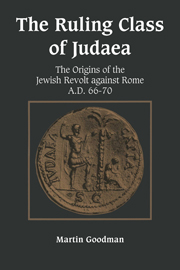Book contents
- Frontmatter
- Contents
- Abbreviations
- Preface
- Maps
- 1 Introduction
- PART I THE RULING CLASS A.D. 6–66
- 2 The new ruling class a.d. 6
- 3 Problems facing the ruling class: economic and social
- 4 Problems facing the ruling class: religious ideology
- 5 Why the ruling class failed
- PART II FACTION STRUGGLE WITHIN THE RULING CLASS
- PART III THE AFTERMATH OF THE REVOLT
- Select bibliography
- Index
4 - Problems facing the ruling class: religious ideology
Published online by Cambridge University Press: 01 June 2011
- Frontmatter
- Contents
- Abbreviations
- Preface
- Maps
- 1 Introduction
- PART I THE RULING CLASS A.D. 6–66
- 2 The new ruling class a.d. 6
- 3 Problems facing the ruling class: economic and social
- 4 Problems facing the ruling class: religious ideology
- 5 Why the ruling class failed
- PART II FACTION STRUGGLE WITHIN THE RULING CLASS
- PART III THE AFTERMATH OF THE REVOLT
- Select bibliography
- Index
Summary
Reasons for blaming the propensity of the Jews to rebel on attitudes derived from their religious ideology have been examined in some detail in Chapter 1 (above, pp. 11–12), as have the limitations in ascribing responsibility for the revolt entirely to such a cause (pp. 15–16). Prime among these limiting factors was the fact that Judaism was too varied for easy generalizations about Jewish beliefs to be made. A few attitudes were standard among all Jews: there was, for instance, universal acceptance that the Torah was in some form the divine law given to Israel in recognition of the Jews' agreement to the covenant with God. But for most of the rest of his explanation of the world each individual Jew felt himself free to drift, as Josephus claims that he did (Vita 10–11), from one religious philosophy to another, seeking any one of the many different paths to virtue laid out before him. As a result there were within the Jewish tradition disparate reactions to the social chaos of first-century Judaea.
Of course, the possible reactions to social malaise uncontrolled by accepted authority were logically almost infinite. To some it might seem sensible to withdraw from society altogether, whether alone or in the company of others equally disillusioned. Or it might seem best to accept disasters with resignation, either making a virtue of hopelessness or indulging in speculation about future happiness for individuals or for all society.
- Type
- Chapter
- Information
- The Ruling Class of JudaeaThe Origins of the Jewish Revolt against Rome, A.D. 66–70, pp. 76 - 108Publisher: Cambridge University PressPrint publication year: 1987



